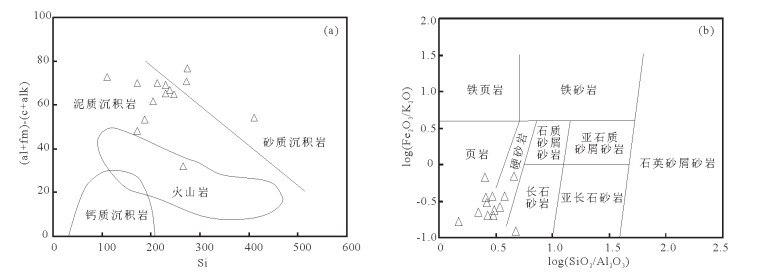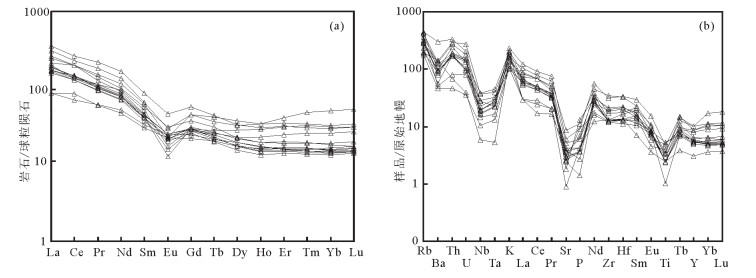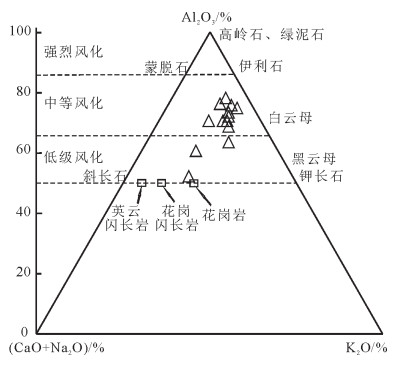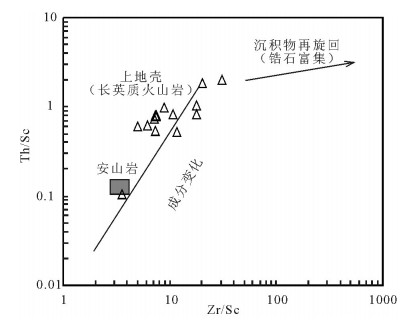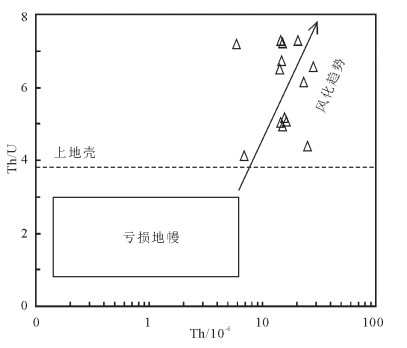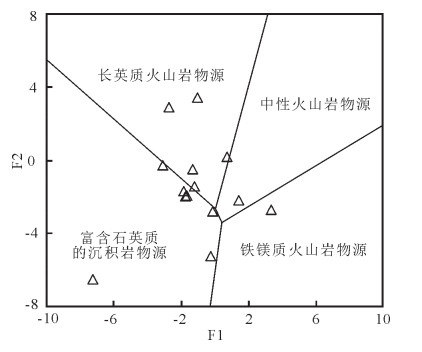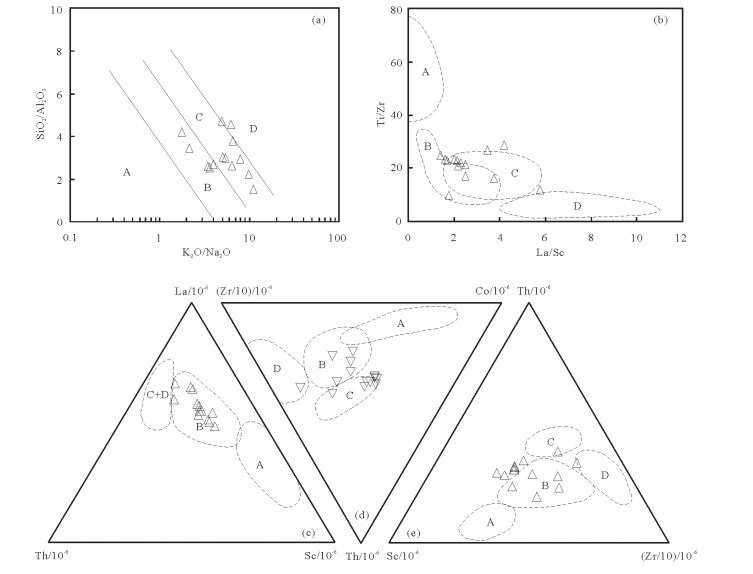Geochemistry of the metamorphic Al-rich sedimentary series and its constraint on provenance in the Paleoproterozoic Liao-Ji active belt
-
摘要:
辽吉活动带分布巨量沉积岩系,不仅记录了自身物源信息,也对该带古元古代构造演化过程具有重要指示意义。选择活动带沉积岩系中最具代表性、成分成熟度较低的变质富铝碎屑岩样品进行主量、微量和稀土元素分析,结果表明,变质富铝碎屑岩的砂岩类型判别结果为硬砂岩、页岩,较低的CIA指数、中低等的风化程度及一致的稀土与微量元素配分形式,指示其物源单一,具有相对活动背景下快速堆积的特点,不存在明显的沉积再旋回。物源分析、构造环境判别及微量元素比值,反映富铝碎屑岩物质源为一套形成于大陆岛弧或活动陆缘构造背景下的长英质岩石。结合前人对活动带中变质沉积岩系碎屑锆石的研究成果,认为辽吉活动带中富铝沉积岩系主要物源的形成时代为古元古代,这意味着作为富铝碎屑岩物源区的古元古代地质体具有大陆岛弧或活动大陆边缘的构造属性,而辽吉活动带最终的闭合可能与活动陆缘背景下弧-陆碰撞有关。
Abstract:Liao-Ji active belt contains various types of rocks and is characterized by widely distributed sedimentary rocks which can record material source information and provide significant evidence of Paleoproterozoic tectonic evolution of the Liao-Ji active belt. In this study, representative low compositional maturity sedimentary rock samples were collected from the active belt and a detailed research on geochemistry was carried out. It is shown by discriminant diagram that the sandstone types of he metamorphic Al-rich clastic rocks are greywacke and shale. Low CIA index, low to mid-degree weathering condition and the consistent rare earth and trace element distribution indicate that all the samples were from the same source which underwent rapid accumulation in an active background with no obvious sedimentary cycle. The geochemical features of the Al-rich clastic rock reveal that the material source was felsic rock formed in a continental island arc or an active continental margin tectonic setting. In combination with previous zircon age obtained in the study area, it is concluded that material source of the Al-rich sedimentary series was formed in Paleoproterozoic, implying that the Paleoproterozoic terrane which served as the material source of the Al-rich clastic rock had tectonic setting features of continental island arc or active continental margin, and that the closing process of the Liao-Ji active belt was probably associated with arc continental collision in an active continental margin tectonic setting.
-
Key words:
- Paleoproterozoic /
- Liao-Ji active belt /
- Jiehekou Group /
- Al-rich clastic rocks /
- geochemistry
-

-
图 4 辽吉古元古代活动带变质富铝碎屑岩Al2O3-(Na2O + CaO)-K2O图解(底图据参考文献[44])
Figure 4.
图 9 辽吉古元古代活动带变质富铝碎屑岩构造环境判别图解(底图参考文献[61])
Figure 9.
表 1 辽吉古元古代活动带地层格架[25]
Table 1. Stratigraphic framework of the Paleoproterozoic Liao-Ji active belt
建造类型 构造背景 残余盆地沉积 变质白云岩-菱镁矿建造:相当于大石桥一塔子岭一带的大石桥组三段,吉南的珍珠门组 盆地收缩-造山阶段
(1.93~1.86Ga)变质碎屑岩建造:相当于盖县组、临江组、大栗子组及部分花山组 变质碳酸盐岩-拉斑玄武岩建造:相当于河栏一草河口地区的大石桥组一段 大陆边缘沉积(弧后盆地大陆一侧) 变质碎屑岩-碳酸盐岩建造:相当于北高家略组、部分大石桥组 岛弧沉积(弧后盆地靠岛弧一侧) 孔兹岩系:包括上部的变质碎屑岩建造(大东岔组大部、宽甸地区的盖县组)和下部的浊积岩建造(南高家略组和荒岔沟组及部分 过渡转换阶段(2.1~1.93Ga) 变质碎屑岩夹火山岩-碳酸盐岩建造:相当于浪子山组、达台山组、北里尔略组 含硼岩系(增生杂岩):相当于南里尔略组和蚂蚁河组(含硼镁铁矿超镁铁质岩) 弧后盆地张裂阶段(2.18~2.1Ga) 表 2 辽吉古元古代活动带变质富铝碎屑岩主量、微量和稀土元素分析结果
Table 2. Major, trace and rare earth elements analyses of the metamorphic Al-rich clastic rocks in the Paleoproterozoic Liao-Ji active belt
岩性 石榴矽线黑云片麻岩 二云母片岩 绢云母千枚岩 样号 09LJ22-1 09LJ22-2 09LJ22-3 09LJ23 12LJ21 09LJ25-1 09LJ25-3 13LJ22-2 09LJ14 09LJ14-2 09LJ14-3 09LJ14-4 11LJ16-1 12LJ29 SiO2 62.10 41.90 64.55 64.50 52.47 55.40 72.10 64.30 59.10 60.30 59.60 54.50 58.09 56.86 TiO2 0.54 0.74 0.75 0.86 1.09 1.02 0.22 0.65 0.53 0.53 0.53 0.51 0.66 0.53 AI2O3 18.10 27.90 15.30 16.90 23.60 20.70 15.20 14.06 20.20 19.70 19.80 21.50 22.37 21.67 Fe2O3 0.91 1.03 0.30 1.13 1.32 1.43 0.52 2.36 1.86 1.10 1.00 3.50 1.45 1.65 FeO 6.27 11.10 5.78 7.43 7.30 6.67 3.23 3.75 5.25 5.50 5.70 4.00 5.95 5.09 MnO 0.13 0.14 0.13 0.10 0.06 0.10 0.04 0.09 0.05 0.05 0.05 0.08 0.04 0.06 MgO 2.69 4.21 1.26 2.46 3.27 2.54 0.96 4.65 2.68 2.65 2.76 3.17 2.54 2.76 CaO 0.62 0.58 2.31 0.31 0.22 0.68 0.42 0.66 0.13 0.27 0.44 3.24 0.30 0.86 Na2O 1.63 0.57 2.76 0.47 0.60 1.78 0.87 0.55 0.64 0.92 0.91 1.44 1.20 0.87 k2O 3.44 6.25 4.85 3.06 5.89 7.04 4.26 3.44 5.06 4.67 4.90 5.17 4.08 5.56 P2O5 0.13 0.13 0.24 0.03 0.06 0.20 0.20 0.29 0.08 0.08 0.08 0.09 0.15 0.09 LOI 2.60 4.01 0.87 1.72 3.29 1.51 1.42 4.61 3.68 3.43 3.51 2.21 2.28 3.41 Total 99.16 98.56 99.10 98.97 99.16 99.07 99.44 99.41 99.26 99.20 99.28 99.41 99.11 99.41 CO2 0.25 0.22 0.52 0.19 0.05 0.17 0.27 0.05 0.22 0.30 0.39 0.28 0.11 0.02 Fe2O3T 7.88 13.4 6.72 9.39 9.43 8.84 4.11 6.53 7.69 7.21 7.33 7.95 8.06 7.31 Fe2O3T+MgO 10.57 17.58 7.98 11.85 12.70 11.38 5.07 11.18 10.37 9.86 10.09 11.12 10.60 10.07 Al2O3/SiQ 0.29 0.67 0.24 0.26 0.45 0.37 0.21 0.22 0.34 0.33 0.33 0.39 0.39 0.38 log (SiO2/Al2O3) 0.54 0.18 0.63 0.58 0.35 0.43 0.68 0.66 0.47 0.49 0.48 0.40 0.41 0.42 log (Fe2O3/K20) -0.58 -0.78 -1.21 -0.43 -0.65 -0.69 -0.91 -0.16 -0.43 -0.63 -0.69 -0.17 -0.45 -0.53 CIA 70.58 76.07 52.20 78.39 75.21 63.68 69.03 74.87 74.87 73.58 72.22 60.77 76.32 70.58 FI -0.11 3.37 -1.02 -0.23 -1.20 -2.72 -3.08 -7.25 -1.73 -1.65 -1.84 0.74 1.44 -1.30 F2 -2.81 -2.72 3.42 -5.26 -1.44 2.89 -0.28 -6.52 -1.98 -1.94 -1.70 0.18 -2.20 -0.50 Mg# 40.36 38.43 27.08 34.18 40.72 36.27 31.64 58.54 40.84 42.13 42.72 44.16 38.45 42.81 Cr 95.90 115.00 28.80 72.60 164.00 77.30 22.10 50.90 83.90 80.30 83.70 92.10 114.00 112.00 Ni 35.90 43.60 7.22 35.70 40.50 26.00 8.68 24.70 41.00 42.70 38.00 41.00 36.80 36.90 Co 18.60 26.00 7.53 16.90 11.40 21.20 7.68 19.60 18.80 18.30 16.00 17.40 15.60 12.70 Rb 128.00 269.00 182.00 148.00 277.00 280.00 123.00 188.00 178.00 175.00 190.00 232.00 207.00 232.00 Sr 76.20 108.00 181.00 51.10 81.10 128.00 52.80 38.40 54.60 60.00 62.60 88.90 64.80 78.50 Ba 603.00 908.00 977.00 395.00 689.00 2120.00 990.00 807.00 651.00 638.00 635.00 853.00 558.00 356.00 Sc 23.10 38.00 12.50 28.30 11.20 33.60 11.40 13.60 18.30 19.30 19.50 19.80 16.60 8.26 Nb 10.30 16.20 26.00 20.60 27.70 20.00 4.12 14.10 12.00 12.00 12.00 11.70 13.80 13.50 Ta 0.68 1.23 1.60 1.32 1.87 0.92 0.22 1.02 0.93 0.94 0.94 0.91 1.14 1.14 Zr 142.00 192.00 384.00 208.00 226.00 358.00 132.00 242.00 136.00 139.00 145.00 145.00 147.00 148.00 Hf 4.06 5.52 10.00 6.29 6.54 10.40 3.51 6.89 3.93 4.01 4.16 4.24 5.02 4.19 Ga 25.70 47.00 27.60 35.10 37.00 33.90 27.40 19.80 31.20 28.80 30.60 33.10 27.40 27.20 U 1.98 3.77 5.74 2.08 2.84 4.25 0.82 2.20 2.20 2.85 3.04 3.06 3.19 1.67 Th 14.40 23.20 25.20 15.00 20.70 27.90 5.90 14.30 14.80 14.40 15.00 15.80 16.20 6.92 Y 37.20 46.70 46.50 38.90 24.60 39.40 26.10 27.60 22.80 26.80 25.00 25.40 29.10 14.10 La 38.70 61.50 72.00 39.80 46.90 83.60 20.10 50.70 36.80 40.90 44.80 43.20 57.80 20.60 Ce 77.20 121.00 140.00 89.60 82.00 161.00 51.10 122.00 78.20 81.30 86.80 87.20 120.00 30.50 Pr 8.93 14.10 17.00 9.40 10.60 20.80 5.56 11.80 8.69 9.68 10.40 10.00 13.20 4.52 Nd 33.20 52.50 61.50 35.60 43.50 76.70 21.90 42.10 32.50 36.00 39.10 37.50 46.40 16.80 Sm 6.19 9.55 10.00 6.40 7.94 13.00 4.61 7.09 5.68 6.26 6.84 6.77 8.72 3.14 Eu 1.36 1.33 1.72 0.75 1.00 2.63 1.29 1.24 1.18 1.28 1.44 1.44 1.80 0.61 Tb 0.97 1.55 1.36 1.04 0.92 1.63 0.76 0.98 0.74 0.82 0.86 0.86 1.16 0.41 Yb 4.39 5.50 8.53 5.27 2.44 5.04 2.58 3.23 2.29 2.63 2.39 2.48 3.11 1.80 Lu 0.69 0.86 1.34 0.78 0.37 0.78 0.39 0.50 0.36 0.41 0.37 0.38 0.44 0.28 Y 37.20 46.70 46.50 38.90 24.60 39.40 26.10 27.60 22.80 26.80 25.00 25.40 29.10 14.10 Eree 189.34 295.07 340.85 209.42 210.66 392.86 121.35 256.3 179.06 193.41 207.11 203.94 270.79 86.11 LREE/HREE 6.97 7.41 7.82 6.51 10.25 10.18 6.23 10.99 10.18 9.75 10.68 10.44 10.84 7.66 δEu 0.68 0.43 0.54 0.36 0.42 0.64 0.85 0.55 0.65 0.64 0.67 0.68 0.66 0.63 (La/Yb) N 6.32 8.02 6.05 5.42 13.79 11.90 5.59 11.26 11.53 11.15 13.45 12.49 13.33 8.21 La/Yb 8.82 11.18 8.44 7.55 19.22 16.59 7.79 15.70 16.07 15.55 18.74 17.42 18.59 11.44 La/Th 2.69 2.65 2.86 2.65 2.27 3.00 3.41 3.55 2.49 2.84 2.99 2.73 3.57 2.98 La/Y 1.04 1.32 1.55 1.02 1.91 2.12 0.77 1.84 1.61 1.53 1.79 1.70 1.99 1.46 La/Sc 1.68 1.62 5.76 1.41 4.19 2.49 1.76 3.73 2.01 2.12 2.30 2.18 3.48 2.49 Zr/Sc 6.15 5.05 30.72 7.35 20.18 10.65 11.58 17.79 7.43 7.20 7.44 7.32 8.86 17.92 Zr/Hf 34.98 34.78 38.40 33.07 34.56 34.42 37.61 35.12 34.61 34.66 34.86 34.20 29.28 35.32 Zr/Th 9.86 8.28 15.24 13.87 10.92 12.83 22.37 16.92 9.19 9.65 9.67 9.18 9.07 21.39 Zr/Nb 13.79 11.85 14.77 10.10 8.16 17.90 32.04 17.16 11.33 11.58 12.08 12.39 10.65 10.96 Th/Sc 0.62 0.61 2.02 0.53 1.85 0.83 0.52 1.05 0.81 0.75 0.77 0.80 0.98 0.84 Th/U 7.27 6.15 4.39 7.21 7.29 6.56 7.20 6.50 6.73 5.05 4.93 5.16 5.08 4.14 Co/Th 1.29 1.12 0.30 1.13 0.55 0.76 1.30 1.37 1.27 1.27 1.07 1.10 0.96 1.84 Ba/Rb 4.71 3.38 5.37 2.67 2.49 7.57 8.05 4.29 3.66 3.65 3.34 3.68 2.70 1.53 Nb/Y 0.28 0.35 0.56 0.53 1.13 0.51 0.16 0.51 0.53 0.45 0.48 0.46 0.47 0.96 Sc/Cr 0.24 0.33 0.43 0.39 0.07 0.43 0.52 0.27 0.22 0.24 0.23 0.21 0.15 0.07 注:测试单位为天津地质矿产研究所实验室,主量元素含量单位为%,微量和稀土元素含量单位为10-6 表 3 辽吉古元古代活动带变质富铝碎屑岩与不同构造背景下杂砂岩地球化学参数对比
Table 3. Comparison of geochemical parameters between the metamorphic Al-rich clastic rocks in the Paleoproterozoic Liao-Ji active belt and sandstone in different tectonic settings
元素 辽吉古元古代活动带
变质富铝碎屑岩不同构造背景下杂砂岩[54, 60-61] 大洋岛弧 大陆岛弧 活动大陆边缘 被动大陆边缘 ∑REE 225.45 58.00 146.00 186.00 210.00 LREE/HREE 9.00 3.80 7.70 9.10 8.50 δEu 0.60 1.04 0.80 0.60 0.55 La/Yb 13.79 4.20 11.00 12.50 15.90 (La/Yb)N 9.89 2.80 7.50 8.30 10.80 Rb 200.64 18.00 67.00 115.00 61.00 Sr 80.43 637.00 250.00 141.00 66.00 Ba 798.57 370.00 444.00 522.00 253.00 Ba/Rb 4.08 21.30 7.50 4.50 4.70 U 2.84 1.09 2.53 3.90 3.20 Th 16.41 2.27 11.10 18.80 17.70 Zr 196.00 96.00 229.00 179.00 298.00 Hf 5.63 2.10 6.30 6.80 10.10 Th/U 5.98 2.10 4.60 4.80 5.60 Zr/Hf 34.70 45.70 36.30 26.30 29.50 Zr/Th 12.75 48.00 21.50 9.50 19.10 Zr/Nb 13.91 49.30 31.50 16.70 37.20 La/Th 2.90 4.26 2.36 1.77 2.20 La/Y 1.55 0.48 1.02 1.33 1.31 Nb/Y 0.53 0.11 0.36 0.43 0.30 Sc 19.53 19.50 14.80 8.00 6.00 Co 16.27 18.00 12.00 10.00 5.00 La/Sc 2.66 0.55 1.82 4.55 6.25 Th/Sc 0.93 0.15 0.85 2.59 3.06 Sc/Cr 0.27 0.57 0.32 0.30 0.16 注:稀土和微量元素含量单位为10-6 -
[1] 白瑾.华北陆台北缘前寒武纪地质与铅锌成矿作用[M].北京:地质出版社, 1993.
[2] 李三忠, 刘永江, 杨振升.辽吉地区古元古代造山作用的大陆动力学过程及其壳内响应[J].地球物理学报, 1998, 41(增刊):142-152. http://www.cnki.com.cn/Article/CJFDTOTAL-DQWX1998S1015.htm
[3] 李三忠, 韩宗珠, 刘永江, 等.辽河群区域变质特征及其大陆动力学意义[J].地质论评, 2001, 47(1):9-18. http://d.old.wanfangdata.com.cn/Periodical/dzlp200101002
[4] Zhao G C, Sun M, Wilde S A, et al. Late Archean to Palaeoproterozoic evolution of the North China Craton:key issues revisited[J]. Precambrian Research, 2005, 136:177-202. doi: 10.1016/j.precamres.2004.10.002
[5] Zhao G C, Cawood P A, Li S Z, et al. Amalgamation of the North China Craton:key issues and discussion[J]. Precambrian Research, 2012, 222/223:55-76. doi: 10.1016/j.precamres.2012.09.016
[6] 赵国春.华北克拉通基底主要构造单元变质作用演化及其若干问题讨论[J].岩石学报, 2009, 25(8):1772-1792. http://d.old.wanfangdata.com.cn/Periodical/ysxb98200908004
[7] Zhai M G, Li T S, Peng P, et al. Precambrian key tectonic events and evolution of the North China Craton[J]. Geological Society of London, Special Publication, 2010, 338:235-262. doi: 10.1144/SP338.12
[8] 张秋生.辽东半岛早期地壳与矿床[M].北京:地质出版社, 1988:115-181.
[9] 陈荣度.辽东裂谷的地质构造演化[J].中国区域地质, 1990, 4:305-315. http://d.old.wanfangdata.com.cn/NSTLQK/10.2174-092986710791859289/
[10] Peng Q M, Palmer M R. The Paleoproterozoic boron deposits in eastern Liaoning, China:A metamorphosed evaporate[J]. Precambrian Research, 1995, 72:185-197. doi: 10.1016/0301-9268(94)00087-8
[11] 杨振升, 李三忠, 刘永江, 等.大造山带中的隆-滑构造——一种前造山期伸展构造型式[J].长春地质学院学报, 1995, 4:361-367. http://www.cnki.com.cn/Article/CJFDTotal-CCDZ504.000.htm
[12] Liu J, Liu Y, Chen H, et al. The inner zone of the Liaoji paleaorift:its early structures and structural evolution[J]. Journal of Asian Earth Sciences, 1997, 15(1):19-31. http://cn.bing.com/academic/profile?id=4f9222f94cd3df292a7b95b25377099e&encoded=0&v=paper_preview&mkt=zh-cn
[13] 李三忠, 杨振升, 刘永江, 等.胶辽吉地区古元古代早期花岗岩的侵位模式及其与隆滑构造的关系[J].岩石学报, 1997, 13(2):189-202. doi: 10.3321/j.issn:1000-0569.1997.02.008
[14] 李三忠, 郝德峰, 韩宗珠, 等.胶辽地块古元古代构造-热演化与深部过程[J].地质学报, 2003, 77(3):328-340. http://d.old.wanfangdata.com.cn/Periodical/dizhixb200303005
[15] Li S Z, Zhao G C, Sun M, et al. Mesozoic, not Paleoproterozoic SHRIMP U-Pb zircon ages of two Liaoji granites, Eastern Block, North China Craton[J]. International Geology Review, 2004, 46(2):162-176. doi: 10.2747/0020-6814.46.2.162
[16] Li S Z, Zhao G C, Sun M, et al. Deformation history of the Paleoproterozoic Liaohe assemblage in the Eastern block of the North China Craton[J]. Journal of Asian Earth Sciences, 2005, 24(5):659-674. doi: 10.1016/j.jseaes.2003.11.008
[17] Li S Z, Zhao G C, Sun M, et al. Are the South and North Liaohe Groups of the North China Craton different exotic terranes? Nd isotope constraints[J]. Gondwana Research, 2006, 9:198-208. doi: 10.1016/j.gr.2005.06.011
[18] Luo Y, Sun M, Zhao G C, et al. LAICP-MS U-Pb zircon ages of the Liaohe Group in the Eastern Block of the North China Craton:Constraints on the evolution of the Jiao-Liao-Ji Belt[J]. Precambrian Research, 2004, 134:349-371. doi: 10.1016/j.precamres.2004.07.002
[19] Luo Y, Sun M, Zhao G C, et al. A comparison of U-Pb and Hf isotopic compositions of detrital zircons from the North and South Liaohe Group:constraints on the evolution of the Jiao-Liao-Ji Belt, North China Craton[J]. Precambrian Research, 2008, 163:279-306. doi: 10.1016/j.precamres.2008.01.002
[20] Li S Z, Zhao G C. SHRIMP U-Pb zircon geochronology of the Liaoji Granitoids:constraints on the Paleoproterozoic Jiao-Liao-Ji belt in the eastern block of the North China craton[J]. Precambrian Research, 2007, 158(12):1-16. http://d.old.wanfangdata.com.cn/NSTLQK/10.1016-j.precamres.2007.04.001/
[21] 贺高品, 叶慧文.辽东-吉南地区早元古代两种类型变质作用及其构造意义[J].岩石学报, 1998, 14(2):152-162. doi: 10.3321/j.issn:1000-0569.1998.02.003
[22] Faure M, Linn W, Monie P, et al. Palaeoproterozoic arc magmatism and collision in Liaodong Peninsula (North-East China)[J]. Terra Nova, 2004, 16:75-80. doi: 10.1111/ter.2004.16.issue-2
[23] Lu X P, Wu F Y, Guo J H, et al. Zircon U-Pb geochronological constraints on the Paleoproterozoic crustal evolution of the Eastern block in the North China Craton[J]. Precambrian Research, 2006, 146:138-164. doi: 10.1016/j.precamres.2006.01.009
[24] 王惠初, 陆松年, 初航, 等.辽阳河栏地区辽河群中变质基性熔岩的锆石U-Pb年龄与形成构造背景[J].吉林大学学报(地球科学版), 2011, 41(5):1322-1361. http://d.old.wanfangdata.com.cn/Periodical/cckjdxxb201105006
[25] 王惠初, 任云伟, 陆松年, 等.辽吉古元古代造山带的地层单元划分与构造属性[J].地球学报, 2015, 36(5):583-598. http://d.old.wanfangdata.com.cn/Periodical/dqxb201505010
[26] Li Z, Chen B. Geochronology and geochemistry of the Paleoproterozoic meta-basalts from the Jiao-Liao-Ji Belt, North China Craton:Implications for petrogenesis and tectonic setting[J]. Precambrian Research, 2014, 255:653-667. doi: 10.1016/j.precamres.2014.07.003
[27] Sun M, Armstrong R L, Lambert R S J, et al. Petrochemistry and Sr, Pb and Nd isotopic geochemistry of the Paleoproterozoic Kuandian Complex, the eastern Liaoning province, China[J]. Precambrian Research, 1993, 62:171-190. doi: 10.1016/0301-9268(93)90099-N
[28] 刘永江, 李三忠.辽宁海城-大石桥-吉洞地区早元古代花岗岩[J].辽宁地质, 1996, 1:10-18. http://www.cnki.com.cn/Article/CJFDTotal-LOAD601.001.htm
[29] 路孝平, 吴福元, 张艳斌, 等.吉林南部通化地区古元古代辽吉花岗岩的侵位年代与形成构造背景[J].岩石学报, 2004, 20(3):381-392. http://d.old.wanfangdata.com.cn/Periodical/ysxb98200403002
[30] 郝德峰, 李三忠, 赵国春, 等.辽吉地区古元古代花岗岩成因及其对构造演化的制约[J].岩石学报, 2004, 20(6):1409-1416. http://www.cnki.com.cn/Article/CJFDTotal-YSXB200406009.htm
[31] 卢良兆, 徐学纯, 刘福来.中国北方早前寒武纪孔兹岩系[M].长春:长春出版社, 1996:195-234.
[32] Wan Y S, Song B, Liu D Y, et al. SHRIMP U-Pb zircon geochronology of Palaeoproterozoic metasedimentary rocks in the North China Craton:Evidence for a major Late Palaeoproterozoic tectonothermal event[J]. Precambrian Research, 2006, 149:249-271. doi: 10.1016/j.precamres.2006.06.006
[33] 孟恩, 刘福来, 崔莹, 等.辽东半岛东北部宽甸地区南辽河群沉积时限的确定及其构造意义[J].岩石学报, 2013, 29(7):2465-2480. http://d.old.wanfangdata.com.cn/Periodical/ysxb98201307015
[34] Zhao G C, Zhai M G. Lithotectonic elements of Precambrian basement in the North China Craton:Review and tectonic implications[J]. Gondwana Research, 2013, 23(4):1207-1240. doi: 10.1016/j.gr.2012.08.016
[35] 刘福来, 刘平华, 王舫, 等.胶-辽-吉古元古代造山/活动带巨量变沉积岩系的研究进展[J].岩石学报, 2015, 31(10):2816-2846. http://www.wanfangdata.com.cn/details/detail.do?_type=perio&id=ysxb98201510002
[36] 辽宁省地质矿产局.辽宁省区域地质志[M].北京:地质出版社, 1989:33-55.
[37] 张景枝, 张永焕.吉林省早前寒武纪地质研究[J].吉林地质, 1998, 17(3):22-31. http://www.cnki.com.cn/Article/CJFDTOTAL-JLDZ803.002.htm
[38] 吉林省地质矿产局.吉林省区域地质志[M].北京:地质出版社, 1988:13-17.
[39] Simonen A. Stratigraphy and sedimentation of the SvecofennidicEarly Archean supracrustal rocks in southwestern Finland[M]. Bulletin of the Geological Society of Finland, 1953. 160:1-64.
[40] Herron M M. Geochemical classification of terrigenous sands and shales from cores or log data[J]. Journal of Sedimentary Research, 1988, 58:820-829. http://d.old.wanfangdata.com.cn/Periodical/njlgdxxb201705016
[41] Sun S S, McDonough W F. Chemical and isotopic systematics of oceanic basalts:implications for mantle composition and processes[J]. Geological Society, London, Special Publications, 1989, 42(1):313-345. doi: 10.1144/GSL.SP.1989.042.01.19
[42] Nesbitt H M, Young G M. Early Proterozoic climates and plate motions inferred from major element chemistry of lutites[J]. Nature, 1982, 299:715-717. doi: 10.1038/299715a0
[43] Nesbitt H W, Young G M. Prediction of some weathering trends of plutonic and volcanic rocks based on thermodynamic and kinetic considerations[J]. Geochimica et Cosmochimica Acta, 1984, 48(7):1523-1534. doi: 10.1016/0016-7037(84)90408-3
[44] Nesbitt H W, Young G M. Formation and diagenesis of weathering profiles[J]. The Journal of Geology, 1989, 97(2):129-147. doi: 10.1086/629290
[45] Nesbitt H W, Fedo C M, Young G M. Quartz and feldspar stability, steady and non-steady-state weathering, and petrogenesis of siliciclastic sands and muds[J]. The Journal of Geology, 1997, 105(2):173-192. doi: 10.1086/515908
[46] Fedo C M, Wayne N H, Young G M. Unraveling the effects of potassium metasomatism in sedimentary rocks and paleosols, with implications for paleoweathering conditions and provenance[J]. Geology, 1995, 23(10):921-924. doi: 10.1130/0091-7613(1995)023<0921:UTEOPM>2.3.CO;2
[47] Roser B P, Coombs D S, Korsch R J, et al. Whole-rock geochemical variations and evolution of the arc-derived Murihiku Terrane, New Zealand[J]. Geological Magazine, 2002, 139(6):665-685. http://www.wanfangdata.com.cn/details/detail.do?_type=perio&id=16b7db80266d03a8738e1dc0a52adb52
[48] McLennan S M, Hemming S, Mcdaniel D K, et al. Geochemical approaches to sedimentation, provenance, and tectonics[J]. Special Paper of Geological Society America, 1993, 284:21-40. doi: 10.1130/SPE284
[49] McLennan S M, Taylor S R, Mcculloch M T, et al. Geochemical and Nd-Sr isotopic composition of deep-sea turbidites:Crustal evolution and plate tectonic associations[J]. Geochimica et Cosmochimica Acta, 1990, 54(7):2015-2050. doi: 10.1016/0016-7037(90)90269-Q
[50] Lambeck A, Huston D, Maidment D, et al. Sedimentary geochemistry, geochronology and sequence stratigraphy as tools to typecast stratigraphic units and constrain basin evolution in the gold mineralized Paleoproterozoic Tanami Region, Northern Australia[J]. Precambrian Research, 2008, 166:185-203. doi: 10.1016/j.precamres.2007.10.012
[51] Taylor S R, McLennan S M. The continental crust:its composition and evolution[M]. Oxford:Blackwell Scientific Publications, 1985:1-328.
[52] McLennan S M, Hemming S R, Taylor S R, et al. Early Proterozoic crustal evolution:Geochemical and Nd-Pb isotopic evidence from metasedimentary rocks, southwestern North America[J]. Geochimica et Cosmochimica Acta, 1995, 59(6):1153-1177. doi: 10.1016/0016-7037(95)00032-U
[53] Roser B P, Korsch R J. Provenance signatures of sandstonemudstone suites determined using discriminant function analysis of major-element data[J]. Chemical Geology, 1988, 67:119-139. doi: 10.1016/0009-2541(88)90010-1
[54] Bhatia M R. Rare earth element geochemistry of Australian Paleo zoic graywackes and mudrocks:Provenance and tectonic control[J]. Sedimentary Geology, 1985, 45(1/2):97-113.
[55] Bhatia M R, Taylor S R. Trace-element Geochemistry and Sedimentary Provinces:a study from the Tasman Geosyncline, Australia[J]. Chemical Geology, 1981, 33(1/2):115-125. http://d.old.wanfangdata.com.cn/NSTLQK/10.1016-0009-2541(81)90089-9/
[56] Girty G H, Hanson A D, Knaack C, et al. Provenance determined by REE, Th, and Sc analysis of metasedimentary rocks, Boyden Cave roof pendant, central Sierra Nevada, California[J]. Journal of Sedimentary Research, 1994, 64:68-73.
[57] Garver J I. Trace elements in shales as indicators of crustal provenance and terrane accretion in the southern Canadian Cordillera[J]. Geological Society of America Bulletin, 1995, 107(4):440-453. doi: 10.1130/0016-7606(1995)107<0440:TEISAI>2.3.CO;2
[58] Floyd P A, Leveridge B E. Tectonic environment of the Devonian Gramscatho basin, south Cornwall:framework mode and geochemical evidence from turbiditic sandstones[J]. Journal of the Geological Society, 1987, 144(4):531-542. doi: 10.1144/gsjgs.144.4.0531
[59] Gu X X, Liu J M, Zheng M H, et al. Provenance and tectonic setting of the Proterozoic turbidites in Hunan, South China:Geo chemical Evidence[J]. Journal of Sedimentary Research, 2002, 72(3):393-407. doi: 10.1306/081601720393
[60] Bhatia M R. Plate tectonics and geochemical composition of sandstones[J]. The Journal of Geology, 1983, 91:611-627. doi: 10.1086/628815
[61] Bhatia M R, Crook K A W. Trace element characteristics of graywackes and tectonic setting discrimination of sedimentary basins[J]. Contributions to Mineralogy and Petrology, 1986, 92(2):181-193. doi: 10.1007/BF00375292
[62] McLennan S M. Relationships between the trace element composition of sedimentary rocks and upper continental crust[J]. Geochemistry Geophysics Geosystems, 2001, 2(4):1021-1024.
[63] 李壮, 陈斌, 刘经纬, 等.辽东半岛南辽河群锆石U-Pb年代学及其地质意义[J].岩石学报, 2015, 31(6):1589-1605. http://d.old.wanfangdata.com.cn/Periodical/ysxb98201506008
[64] 郭春影, 李子颖, 韩军, 等.辽东大石桥组蛇纹石化大理岩中铀矿化特征及形成时代[J].地质通报, 2017, 36(4):565-574. doi: 10.3969/j.issn.1671-2552.2017.04.010 http://dzhtb.cgs.cn/gbc/ch/reader/view_abstract.aspx?file_no=20170410&flag=1
[65] Zhao G C, Cao L, Wilde S A, et al. Implications based on the first SHRIMP U-Pb zircon dating on Precambrian granitoid rocks in North Korea[J]. Earth and Planetary Science Letters, 2006, 251:365-379. doi: 10.1016/j.epsl.2006.09.021
[66] Zhou X W, Zhao G C, Wei C J, et al. EPMA U-Th-Pb monazite and SHRIMP U-Pb zircon geochronology of highpressure pelitic granulites in the Jiaobei massif of the North China Craton[J]. American Journal of Science, 2008, 308(3):328-350. doi: 10.2475/03.2008.06
[67] Li S Z, Zhao G C, Santosh M, et al. Paleoproterozoic structural evolution of the southern segment of the Jiao-Liao-Ji Belt, North China Craton[J]. Precambrian Research, 2012, 200/203:59-73. doi: 10.1016/j.precamres.2012.01.007
[68] Tam P Y, Zhao G C, Zhou X W, et al. Metamorphic p-T path and implications of high-pressure pelitic granulites from the Jiaobei massif in the Jiao-Liao-Ji Belt, North China Craton[J]. Gondwana Research, 2012, 22(1):104-117. doi: 10.1016/j.gr.2011.09.006
[69] 马立杰, 崔迎春, 刘俊来, 等.辽东北辽河群斜长角闪岩的地球化学特征及构造背景[J].山西大学学报(自然科学版), 2007, 30(4):515-524. doi: 10.3969/j.issn.0253-2395.2007.04.022
[70] 陈斌, 李壮, 王家林, 等.辽东半岛~2.2Ga岩浆事件及其地质意义[J].吉林大学学报(地球科学版), 2016, 46(2):302-320.
[71] Wu F Y, Yang J H, Wilde S A, et al. Detrital zircon U-Pb and Hf isotopic constraints on the crustal evolution of North Korea[J]. Precambrian Research, 2007, 159:155-177. doi: 10.1016/j.precamres.2007.06.007
[72] Zhai M G, Guo J H, Li Z, et al. Linking the Sulu UHP belt to the Korean Peninsula:Evidence from eclogite, Precambrian basement, and Paleozoic sedimentary basins[J]. Gondwana Research, 2007, 12(4):388-403. doi: 10.1016/j.gr.2007.02.003
[73] Zhai M G, Guo J H, Peng P, et al. U-Pb zircon age dating of a rapakivi granite batholith in Rangnim massif, North Korea[J]. Geological Magazin, 2007, 144(3):547-552. doi: 10.1017/S0016756807003287
[74] Kim S W, Kwon S H, Yi K W, et al. Arc magmatism in the Yeongnam massif, Korean Peninsula:Imprints of Columbia and Rodinia supercontinents[J]. Gondwana Research, 2014, 26:1009-1027. doi: 10.1016/j.gr.2013.08.020
[75] 吴福元, 李秋立, 杨正赫, 等.朝鲜北部狼林地块构造归属与地壳形成时代[J].岩石学报, 2016, 10(32):2933-2947. http://d.old.wanfangdata.com.cn/Periodical/ysxb98201610003
-



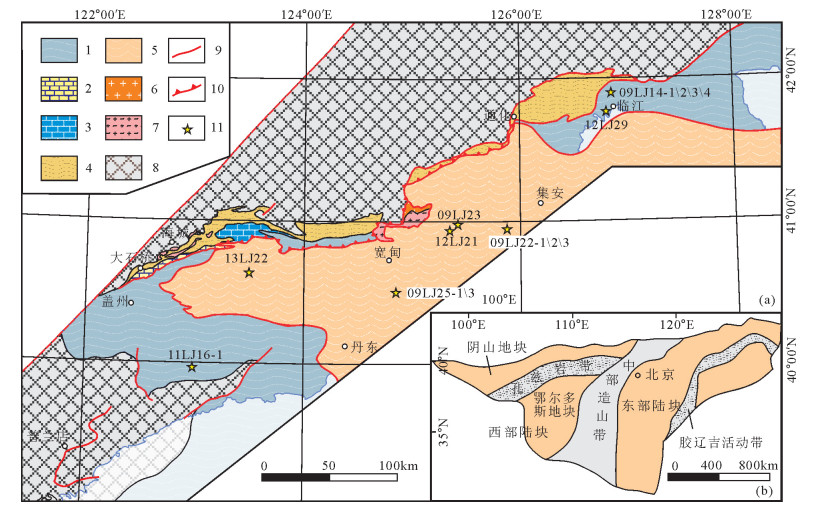
 下载:
下载:

